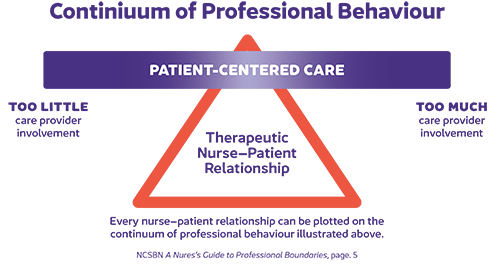Professional boundaries are the borders or limits that a nurse sets to protect themselves and their clients from developing unprofessional, unethical, confusing, or conflicting relationships. Boundaries are required when developing therapeutic relationships with clients due to the personal nature of nursing care.
Boundaries sit on a continuum that ranges from under-involvement to over-involvement. The zone of the therapeutic relationship is in the middle. Client harm can occur at either end of the continuum. Appropriate professional boundaries create a zone that allows for a safe, effective relationship between the nurse and the client.


As the nurse, you are always responsible for establishing and maintaining appropriate boundaries, regardless of how a client behaves. Some boundaries are clear-cut; others are less clear and require your professional judgment. It’s important that you recognize when a professional relationship is moving out of the zone of helpfulness and into the nonprofessional zone, and that you take immediate action.
Boundary crossings and violations
Inappropriate professional behaviours can be separated into three categories:
- Boundary crossing
- Boundary violation
- Sexual misconduct
Some minor behaviours may appear harmless but can lead to behaviour patterns that indicate the nurse-client relationship is no longer in the therapeutic zone.

Warning signs of boundary issues
Signs of inappropriate behaviour can be subtle; however, these signs indicate a need to reflect on the nurse-client relationship and clarify boundaries. The following behaviours can signal potential boundary issues.
- Over-involvement with a client
- Under-involvement with a client
What to do if you see warning signs
Some boundaries are absolute and must never be violated. Others require judgment and careful consideration of the context. Some behaviors, while unacceptable in most contexts, may be acceptable and appropriate in special circumstances.
- Reflect on your situation
Caring for friends and family
In situations where you have both a personal and professional relationship with a client, you are acting in a dual role. When you have a personal relationship with someone, you may find it difficult to be objective enough to have an effective professional relationship. You may have difficulty separating personal feelings, values, and beliefs from your professional and ethical obligations.
BCCNM recommends that, when possible, nurses avoid dual roles and transfer overall responsibility for care to another health-care provider.
- If you are unable to transfer care or choose to provide some care, you will need to use caution. Ensure:
- How to maintain a therapeutic nurse-client relationship